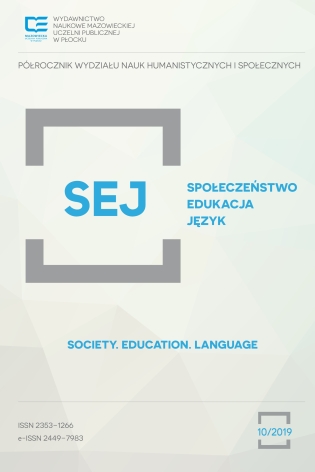Dwa indywidualizmy. Myśl Tomasza Hobbesa w świetle interpretacji Leo Straussa i Michaela Oakeshotta
Słowa kluczowe:
Thomas Hobbes, Michael Oakeshott, Leo Strauss, indywidualizm, liberalizmAbstrakt
DOI: 10.19251/sej/2019.10(3)
Abstrakt
Tomasz Hobbes jest jednym z tych filozofów, których myśl wyprzedzała swój czas i musiała czekać kilka wieków, by zostać docenioną. Uznanie za kluczowe dla europejskiej filozofii politycznej przyszło dla dzieła autora Lewiatana w XX w., na fali rozczarowania idealistyczną filozofią niemiecką. Narodziły się wówczas dwa nurty badań nad Hobbesem. Przedstawiciele pierwszego – z Carlem Schmittem na czele – uważali, iż Hobbesa należy uznać za twórcę absolutystycznego myślenia o polityce. Przedstawiciele drugiego, opisywani w tekście Leo Strauss i Michael Oakeshott – za twórcę myślenia liberalnego. Strauss i Oakeshott inaczej jednak do takiej konkluzji w swoich pracach o Oakeshocie dochodzili. Strauss – poprzez analizę kwestii heroizmu w myśleniu Hobbesa; Oakeshott – poprzez położenie nacisku na hobbesowską filozofię języka. W artykule autor przedstawia zbieżności i różnice pomiędzy podejściami Straussa i Oakeshotta, wskazując na liberalny rdzeń myśli Hobbesa, uwidoczniony w jego interpretacjach autorstwa dwóch filozofów.
Słowa kluczowe
Thomas Hobbes, Michael Oakeshott, Leo Strauss, indywidualizm, liberalizm
Bibliografia
Bibliografia
Armon Adi. 2010. „Just before the >>Straussians<<: The Development of Leo Strauss’s Political Thought from the Weimar Republic to America”. New Ger¬man Critique No. 111
Bunce Robert. Thomas Hobbes. 2009. New York-London: Bloomsbury
Douglass Robin. 2015. Rousseau and Hobbes: Nature, Free Will, and the Passions. Oxford: Oxford University Press
Duncan Stewart. 2010. „Leibniz on Hobbes’s materialism”. Studies in History and Philosophy of Science Volume 41, Issue 1
Evrigenis Ionnis. 2011. Fear of enemies and collective action. Cambridge: Cambridge University Press
Gerencser Steven. 1995. „Voices in Conversation: Philosophy and Politics in the Work of Michael Oakeshott”, The Journal of Politics Vol. 57, No. 3
Harrison Ross. 2003. Hobbes, Locke, and Confusion’s Masterpiece. Cambridge: Cam¬bridge University Press
Keedus Liisi. 2012. „Liberalism and the Question of „The Proud”: Hannah Arendt and Leo Strauss as Readers of Hobbes”. Journal of the History of Ideas Vol. 73, No. 2
Keedus Liisi. 2015. The Crisis of German Historicism. The Early Political Thought of Hannah Arendt and Leo Strauss. Cambridge: Cambridge University Press
Kimla Piotr. 2014. „Czy Tomasz Hobbes był liberałem? ”. Czasopismo Prawno-Hi¬storyczne tom LXVI – 2014 – Zeszyt 1
Laird John. 1934. Thomas Hobbes. London: Ernest Benn
Manent Pierre. 1994. Intelektualna historia liberalizmu. Kraków: Znak
Merrill Christopher. 2000. „Leo Strauss’s Indictment of Christain Philosophy”. The Review of Politics Vol. 62, No. 1, Christianity and Politics: Millennial Issue II
Miller Ted. 2001. „Oakeshott’s Hobbes and the Fear of Political Rationalism”. Political Theory Vol. 29, No. 6
Oakeshott Michael. 1935–1936. „Thomas Hobbes”. Scrutiny 4
Oakeshott Michael. 1962. Rationalism in politics and other essays. London: Methuen
Oakeshott Michael. 1932. „The New Bentham”, Scrutiny 1 (1932)
Oakeshott Michael. 1993. Religion, Politics, and the Moral Life. New Haven: Uni¬versity of California Press
Oakeshott Michael. 1975. Hobbes on civil association. Oxford. Oxford University Press
Oakeshott Michael. 1932–1934. „John Locke”, Cambridge Review 54
Orłowski Hubert. 2008. Spory o Sonderweg, o niemiecką >>drogę odrębną<<. W Son¬derweg. Spory o >>niemiecką drogę odrębną<<, red. Hubert Orłowski, Poznań: Wydawnictwo UAM
Parkin Jon. 1999. „Hobbism in the later 1660s: Daniel Scargill and Samuel Parker”. Historical Journal Vol. 42, No. 1
Polakowski Marcin. 2009. „Źródła filozofii politycznej Hobbesa w ujęciu Michaela Oakeshotta”. Dialogi polityczne 12
Przyłębski Andrzej. 2011. Duch czy życie? Studia i szkice z filozofii niemieckiej, Po¬znań: Wydawnictwo UAM
Riley Peter. 2007. „Kant against Hobbes in >>Theory and Practice<<”, Journal of Moral Philosophy, Volume 4, Issue 2
Rogers John. 1988. Hobbes’s Hidden Influence. W Perspectives on Thomas Hobbes, red John Rogers, Oxford: Oxford University Press
Schmitt Carl. 2012. Teologia polityczna i inne pisma. Warszawa: Aletheia
Strauss Leo. 1988 „Correspondence with Karl Löwith”. Independent Journal of Philo¬sophy/Unabhängige Zeitschrift für Philosophie 5–6
Strauss Leo. 2007. „Trzy fale nowożytności”. Przegląd Polityczny nr 84
Strauss Leo. 1997. Jewish Philosophy and the Crisis of Modernity: Essays and Lec¬tures in Modern Jewish Thought, New York: Suny Press
Strauss Leo. 1969. Prawo naturalne w świetle historii. Warszawa: PAX
Strauss Leo. 1989. An Introduction to Political Philosophy. Ten essays. Detroit: Wayne University Press
Strauss Leo. 1998. Sokratejskie pytania. Eseje wybrane. Warszawa: Aletheia
Strauss Leo. 1996. Political Philosophy of Hobbes. Its Basis and Its Genesis. Chicago: University of Chicago Press
Strauss Leo. 2008. „Uwagi do >>Pojęcia polityczności<< Carla Schmitta”. Kronos. Metafizyka – kultura – religia 3
Strauss Leo. 2012. O tyranii. Kraków: Wydawnictwo UJ
Tanguay Daniel. 2007. Leo Strauss. An Intellectual Biography. New Haven: University of California Press
